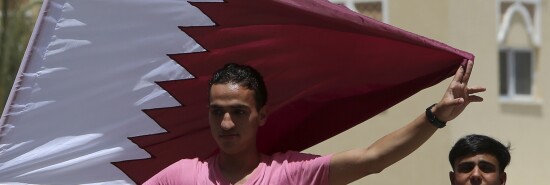
Qatar should stop its smear campaigns
Michael Rubin
On June 5, 2017, Saudi Arabia, Bahrain, the United Arab Emirates, and Egypt severed relations with Qatar over allegations that the small Persian Gulf state financed extremism. Those nations complained that Qatari largesse supported Muslim Brotherhood-affiliated groups, including some engaged in terrorism. The subsequent blockade and diplomatic cold war lasted five years.
Today, Qatar has reconciled with its Arab neighbors, but the reverberations of Qatar’s strategy remain. Relations with Americans do not switch on and off as easily as with Arab brothers. Dishonesty has a cost.
DON’T DERAIL UN INVESTIGATION OF TIGRAY GENOCIDE IN NAME OF PEACE
At the height of Qatar’s diplomatic campaign, it created a network of organizations that amplified and laundered Qatari talking points. While Qatar has been open about its support for Al Jazeera, it has sought to obfuscate its ties to nominally independent outlets like Middle East Eye that would make spurious assertions that other Qatari-supported outlets would then amplify. After criticism mounted about Qatar’s close ties to the Taliban, for example, Andreas Krieg, who previously worked as a contractor for the Qatari armed forces, argued in the Middle East Eye that Abu Dhabi’s links to the terrorist Haqqani network “trumped Qatar’s Taliban relations.”
This was nonsense, but within days, several commentators who uncritically retweet Qatari talking points amplified the article. Noon Post and Arabi21 translated the article into Arabic. Within one week, John Hulsman, a global political risk consultant, penned a piece in The Hill repeating the charges. Similar networks promoted the idea that Israel sought to prevent Gulf reconciliation or, against the backdrop of the Qatar FIFA bribery scandal, that the UAE sought to “sportswash” its reputation.
For me, it is personal.
I was a victim of the Qatari network. I ended up on Qatar’s enemy list for two reasons. I have long criticized both the politicization of human rights and the Muslim Brotherhood. In 2014, I touched the Qatari third rail. First, I criticized human rights groups for uncritically incorporating reports authored by a group founded by a U.S. Treasury Department-designated Qatari Al Qaeda financier. Then I criticized Human Rights Watch (HRW) for whitewashing violence by Emiratis accused of complicity in an alleged Muslim Brotherhood-inspired coup attempt.
Nicholas McGeehan, a former HRW analyst and Middle East Eye contributor who made an about-face on Qatar about a decade ago, accused me falsely of being on the Emirati payroll. His evidence? First, Emiratis liked my criticism of the Muslim Brotherhood. Second, I once met with an Emirati lobbyist. He omitted that I also met with a Qatari lobbyist around the same time. Responsible analysts talk to all sides. Nor was I alone as Doha cast its defamation net.
Qatar might learn a lesson from the experience, or Saudi Arabia and Turkey.
Two decades ago, Saudi Arabia opposed the war in Iraq. The Kingdom gave lavishly to a number of academics and think tanks, many of whom launched ad hominem attacks on those supportive of Bush Administration policy. Saudi diplomats claimed plausible deniability for the virulent anti-Semitism that followed or deflected responsibility for the actions of the proxies they funded, but few in Washington forgive and forget. Today, the policy debate has moved on, but Saudi diplomats have never fully recovered access to the people they defamed. Influence suffered.
The same is true with Turkey, Iraqi Kurdistan, and Ethiopia. Each used troll armies to try to disqualify opponents rather than debate issues on their merits. Each ultimately hemorrhaged influence. Turkey’s Congressional Caucus today is smaller than the Congressional Algae Caucus.
CLICK HERE TO READ MORE FROM THE WASHINGTON EXAMINER
Back to Qatar: As the country seeks to punch above its weight in international affairs, it should welcome criticism and debate rather than seek to disqualify or fund elaborate networks of pop-up media outlets and think tanks each supported by the same handful of commentators and academics sucking from the Qatari teat. Doha may believe it has plausible deniability, but it fools no one. Every day the Qatari network spreads its poison, Qatar’s long-term influence fades.
Michael Rubin (@mrubin1971) is a contributor to the Washington Examiner’s Beltway Confidential. He is a senior fellow at the American Enterprise Institute.
